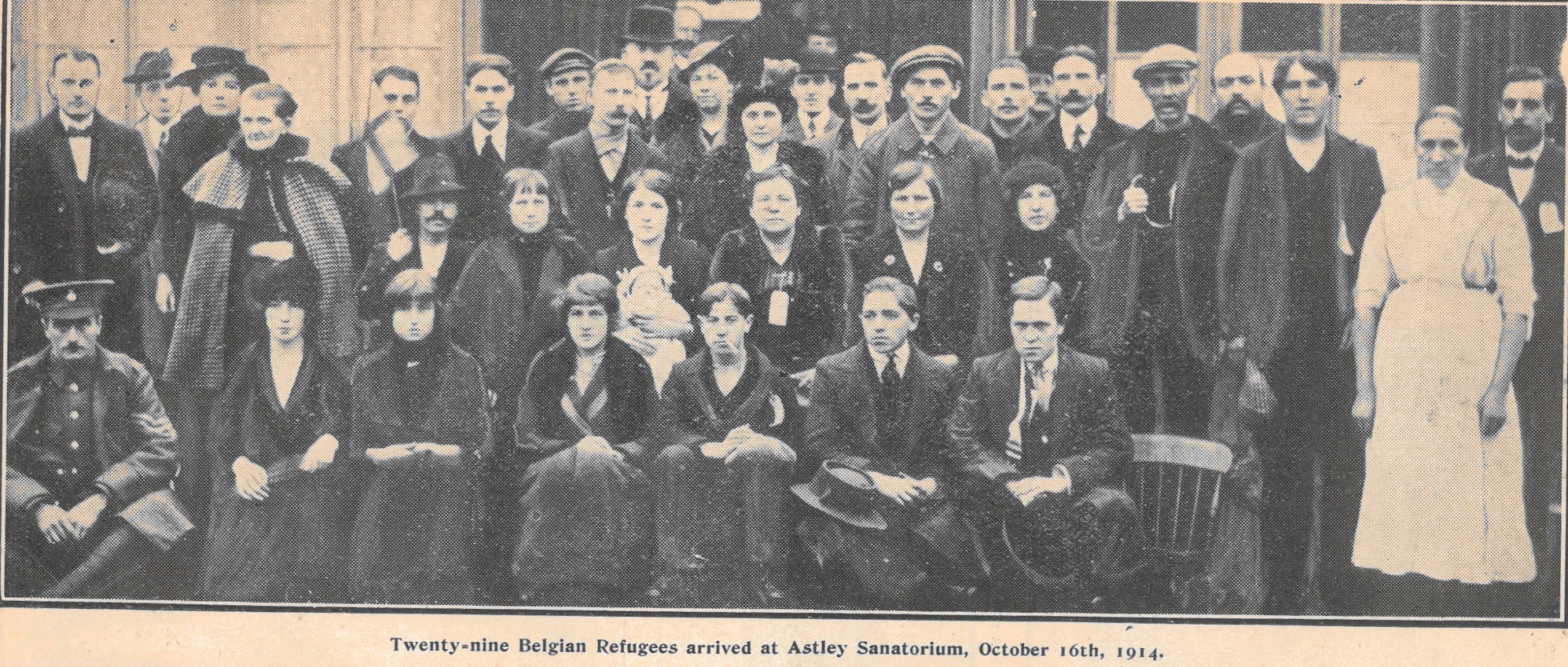Migration Stories: Belgian Refugees
Posted on 22nd Sep 2025 by AWL Team
During the First World War, following the German invasion of Belgium in August 1914, around 250,000 Belgians came to Britain to escape the conflict. Refugees were mainly civilians but also included wounded and discharged Belgian Soldiers.
On arrival to the UK, refugees were dispersed from London to communities around the UK, including via Manchester to the Leigh and Wigan areas.
Local relief committees were set up to arrange and administrate accommodation and financial aid to support the refugees. In a letter to the Leigh Mayor, dated 9th September 1914, The Local Government Board in Whitehall appealed to the Town Council for the arrangement of temporary accommodation for Belgian nationals fleeing the war.i In October 1914, some of the first local arrivals were dispatched to Parbold in Wigan and are reported to have been warmly welcomed at the station by local residents. ii The local press reported the arrival of twenty-nine Flemish speaking Belgians in Astley, recounting their stories of hardship, distress, separation and loss.iii
Local organisations were invited to pay towards the accommodation and upkeep of refugees. A letter to the Consulate de Belgique in Manchester from the Leigh Town Clerk, dated 22nd October 1914, discusses an offer of eight furnished houses for eight Belgian families, along with offers from local residents to take in twenty Belgian children. iv In a letter to the Leigh Town Clerk on 22nd October 1914, Leigh Literary Society offered to provide a home for a Belgian family and be responsible for their maintenance. v Similar offers were made by other local organisations and some, more affluent residents, volunteered use of their transport to convey refugees from Manchester to Leigh.
However, not all Belgians were content to stay in the area. A letter from the War Refugees Committee in London to the Leigh Relief Committee, dated 16th December 1914, discusses a party of seven refugees requesting to join their husbands in Calais. vi Letters were sent between Town Clerks across the UK regarding assistance in locating and reuniting family members who had been dispersed to different parts of the country. As the war progressed and Belgian men residing in the UK were required to present for military service, families moved to live with family members elsewhere in the country. The Leigh Local Relief Committee paid for travel passes for families to visit their husbands or their relocation to live with other family members. Refugees were also returned from Leigh to London by Leigh Local Relief Committee, some at their own request and others due to reports of their anti-social behaviour from their Belgian neighbours.
In June 1915 Mon Von Weycamp wrote to the War Relief Committee, setting out his objections to having been dispatched to Leigh. These included that, being in the midst of the coal industry, it is one of the most unhealthy places in England and consequently ill-suited to his wife’s health. He also reports that the house, number 4 South Avenue, is too small to be shared with another family. Stating that ‘there is certainly a mistake in having placed me among miners and foundrymen…’. He also speaks of the scale of his allowance and it being impossible to live on. To conclude, he reports ‘I am very sorry Gentlemen to say that there has been contemptuous treatment to such a degree so I can recon on you Gentlemen…that you will use all possible dispatch in getting me back as soon as possible to London’. vii
In reply to Mr Weykamp’s request to return to London, Leigh Local Relief Committee corresponded with the War Relief Committee in London ‘My committee much regret that they are unable to offer to Mr Weykamp and his family hospitality in helping with the standard of comfort which he has been accustomed to, and which they think he deserves’.viii
Not all Belgians lived peaceably together. Complaints were made to the committee regarding the conduct and quarrels between the Belgians living in Hooten Gardens in Leigh. The Schriber family (5 adults and 1 child) were considered a persistent problem and were eventually removed back to London on the grounds that ‘The family we are returning do not seem able to live peaceably with their neighbours’. ix
After the end of the First World War in 1918 most Belgians returned home, a relatively small number did remain in the UK though exact numbers are unknown.
References:
- Letter to Mayor of Leigh from the Local Government Borad, Whitehall, on 9th September 1914
- Wigan Observer, 15 October 1914, p.2
- Leigh Chronicle, 23 October 1914, p.6
- Letter to the Consulate de Belgique, Manchester from the Leigh Town Clerk on 22nd October 1914
- Letter from Leigh Literary Society to the Leigh Town Clerk, W.H. Cowburn, on 22nd October 1914
- Letter to the Leigh Committee from the War Refugees Committee in London, 16th December 1914
- A document containing the translation of a letter by Mons Weykamp of Leigh on 14th June 1915
- Letter in reply to Mr Weykamp from Leigh Local Relief Committee to the Warx Relief Committee in London, 16th June 1915
- Letter to London War Relief Committee from Leigh Local relief Committee on 29th September 1915
By Andrea Smethurst
